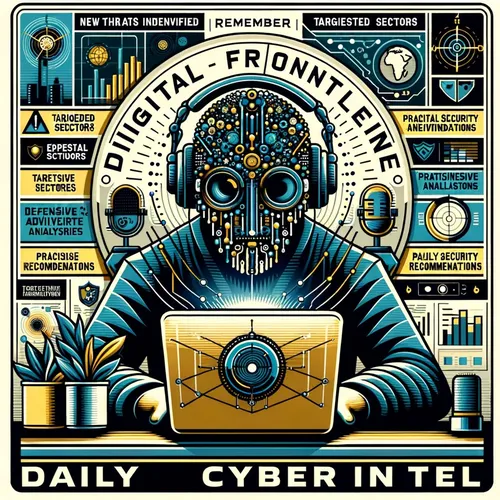China's Hacker Syndicate Scores Big! US Cyber Command Revs Up as AI Threats Loom Large
- Author
- Quiet. Please
- Published
- Wed 13 Aug 2025
- Episode Link
- https://www.spreaker.com/episode/china-s-hacker-syndicate-scores-big-us-cyber-command-revs-up-as-ai-threats-loom-large--67359487
This is your Digital Frontline: Daily China Cyber Intel podcast.
Hey listeners, it’s Ting here bringing you the latest byte-sized intelligence from Digital Frontline: Daily China Cyber Intel, live this Wednesday, August 13, 2025. Skip the pleasantries, let’s dive right into what’s fueling command-line anxiety today.
So, over the past 24 hours, the US cyber community is buzzing about a massive operation by Chinese-speaking groups—fronted off the grid by someone named Lao Wang. This syndicate compromised up to 115 million American payment cards, hitting both Apple Pay and Google Wallet with an advanced smishing campaign. The twist? They peddled preloaded devices, not just siphoning data but selling the loot direct to eager buyers. Brokerage accounts weren’t spared; businesses and high-value individuals faced targeted add-on hacks. This smishing-as-a-service platform literally doubled in size, with 1,600 new members jumping in during the last big surge. If you run payments or fintech, get your CTO to triple-check those authentication flows.
Travel and critical infrastructure remain juicy targets. Airlines like WestJet are limping through a breach that exposed valuable customer data. And let’s not forget the bigger ransomware players—China’s hackers now team up pragmatically with Russia, Iran, and North Korea, moving beyond parallel strikes into true coordinated cyber mischief. Their aim: to disrupt US economic and military interests, leveraging ransomware and espionage on anything from pipelines to satellites.
Washington, catching the scent of these sophisticated moves, rolled out new DOJ Data Security Program rules. These put companies with China ties in the crosshairs—even for what seem like routine data flows between US subs and their Chinese parent firms. Sensitive personal data and government info—think health, biometric, location—are restricted on pain of $377,000 fines per civil violation, and $1 million plus prison for criminal cases. That’s more than coffee money, folks. Boards need to be mapping data movement and drafting disclosure policies yesterday.
On the flip side, US Cyber Command is still revving under a new executive order that labels China as the “most active and persistent cyber threat” to government and critical sectors. General Pete Hegseth even called the risk ‘imminent,’ especially with Xi Jinping’s 2027 goal for a Taiwan play—a strategic context for cyber escalation in the region. Commanders are pushing for upgrades, not just in defensive tools and talent but faster acquisitions and public-private partnerships. A Ferrari in second gear? Not for long if the hackers have their way.
As for the AI angle, Chinese firms are collecting data—sometimes on influential Americans—and unleashing algorithms to sway public opinion and monitor Congress. The US intelligence community is tracking attempts to surpass the US in global AI dominance, with cyber espionage as the sharp edge. The next wave: weaponized AI agents able to cross ‘high capability’ thresholds, even in biotech threat domains. If your SOC isn’t prepping for rogue large language models, now’s the time.
Practical recommendations: lock down payment systems, enforce multifactor authentication, map your sensitive data flows, update incident-response playbooks, and monitor for coordinated threat campaigns—not just China, but the whole alignment crew. Participate in joint industry–public sector drills, and put AI model guardrails in place.
That’s the byte for today, listeners. Thanks for tuning in! Subscribe for more, and remember—knowledge is your best firewall. This has been a Quiet Please production, for more check out quiet please dot ai.
For more http://www.quietplease.ai
Get the best deals https://amzn.to/3ODvOta
